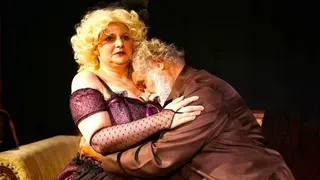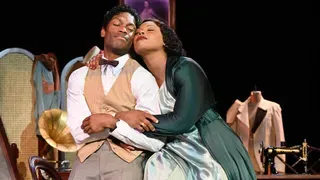December 10, 2009
The Brigitte Bardot: Classic Collection
Kilian Melloy READ TIME: 3 MIN.
The films included on the 3-DVD The Brigitte Bardot Classic Collection possess a campy charm, and span genres from farce (Plucking the Daisy) to torrid melodrama (The Night Heaven Fell) to Art with a neon capital A (Don Juan, or If Don Juan Were A Woman), none of these titles live up to the billing of "classics." For that, this collection would have needed to include ...And God Created Woman, or Contempt, or Masculine-Feminine, all true classics in which Bardot starred.
Plucking the Daisy (or, of you prefer one of the other titles under which it was release, Mademoiselle Striptease), the black-and-white 1956 comedy directed by Marc All�gret, packs plenty of sex and confusion into its 99 minutes, but while events (and French horndogs) swirl around Bardot's sweetly naive young writer Agn�s, there's nothing profound about the film, except, if your tastes run that way, Bardot's extremely modest turn as a masked dancer in a contest. (That's right, she needs to win the prize money on order to... oh, never mind, get yourself a bottle of something French and see it for yourself.) Bardot is the best part of the film: fresh-faced and something of a gamine, she pulls off the part of Agn�s with verve.
Re-teaming with her ...And God Created Woman director, Roger Vadim (who was also her husband) for 1958's The Night Heaven Fell, Bardot plays Ursula--again, the role is young and naive, but it's erotically charged, too, for Ursula has just finished her education at a convent and no sooner has she arrived back home with her aunt and uncle than she falls in love with a local tough named Lambert (Stephen Boyd). The production values are quite good for the time--wide-screen format and color film--but the script can't decide whether the thrust of the story is the three-sided web of attraction between Lambert, Ursula, and Ursula's aunt, Florentine (Alida Valli), in the wake of the Spanish civil war--or a poorly-conceived religious allegory: Lamberto, at age 33, makes for a handsome sacrifice--a lamb, if you will--but it's convent-educated Ursula who becomes the film's tragic figure.
Then there's Bardot's final feature film, again directed by Roger Vadim, Don Juan, or, If Don Juan Were A Man. Mod (as in, modern in the retro-sense of the word) and messy, this 1973 production smacks of ego and overt symbolism. Roger Vadim is credited here simply as VADIM, in bold red; Bardot plays a rich playgirl named Jeanne who lives in a shining silver submarine kitted out with fur rugs and a big bed (and windows and a fireplace, no less). Jeanne likes to possess men and then destroy them; when she seeks the company of her cousin Paul (Mathieu Carri�re), a priest, is it to make her confession, or to seduce him? Both, it would seem; Jeanne has killed someone, but it takes a while for her to reveal who it was.
Meantime, she explains (with the help of flashbacks) how she ruined a prominent official, humiliated a brutish, sexist playboy (a fellow much like herself, actually), and drew a musician (played by Robert Walker, Jr.) into her clutches. It's all part and parcel for Jeanne, who sees herself as a man, and not just any man: she claims to be the reincarnation of Don Juan. (Mozart's opera Don Giovanni, played at a funeral, gives the game away early on.) This film has the look and mood of something you'd stumble across at 3 a.m., and it makes you feel like you've been up all night no matter when you watch it. Bardot is long past her gamine days; here, she's like Catherine Deneuve, if Deneuve were more hard-edged and jaded.
The DVDs all share the same set of minimal special features: theatrical trailers for Plucking the Daisy, ...And God Created Woman, and The Night Heaven Fell, and a Brigitte Bardot filmography.
Kilian Melloy serves as EDGE Media Network's Associate Arts Editor and Staff Contributor. His professional memberships include the National Lesbian & Gay Journalists Association, the Boston Online Film Critics Association, The Gay and Lesbian Entertainment Critics Association, and the Boston Theater Critics Association's Elliot Norton Awards Committee.







